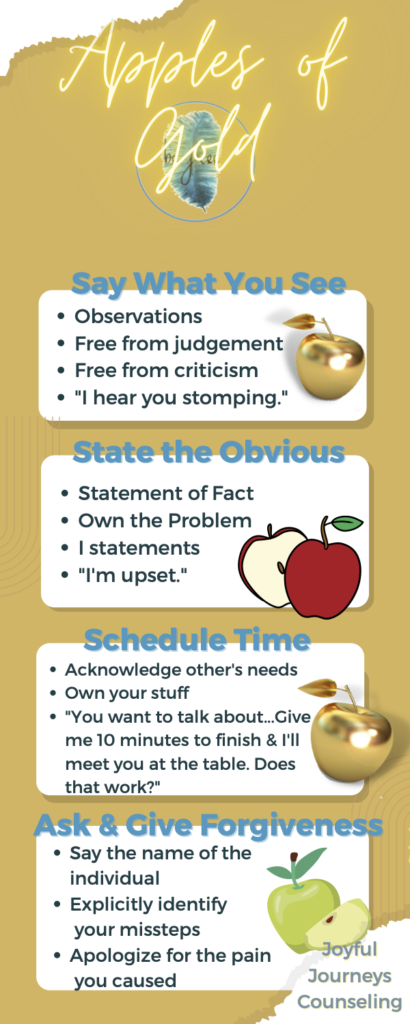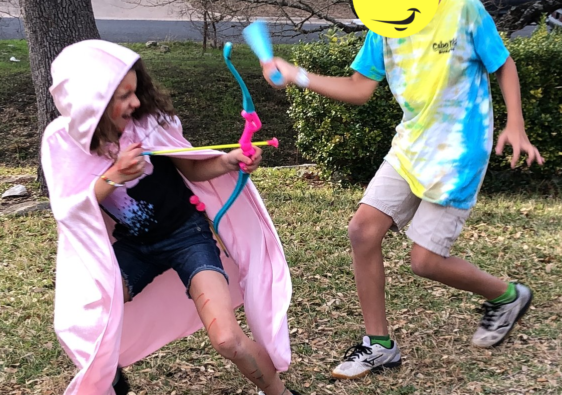An Ageless Interpersonal Communication Plan
(Psst, are you in urgent need of the plan? Skip these first few paragraphs describing the origins of Apples of Gold works and go straight to the how-to communicate for and with kids steps, below.)
My absolute favorite course in graduate school was a communications course. Interestingly, I did not need this credit and took it as an elaborate step towards a laborious delay in the internship process. The material remains relevant and quite handy despite not being a graduation requirement in my Marriage and Family Therapy program. As a full-time clinician, I regularly pull out and refer to Petersen’s (2015) communication guide. Sometimes, this formal approach doesn’t work. In those instances, I offer Apples of Gold.
Apples of Gold is an effective method to communicate with children (and adults). This tool is designed for child-to-child and caregiver-to-child connection and communication. The honest, mature adult can also engage with this method for adult-to-adult conversations. Often manuals may feel restrictive, as in the previous reference. They require focused attention, emotional regulation, and a sincere connection and honesty about one’s feelings, thoughts, and preferences. While Apples of Gold may draw upon a foundation of much the same, the format is highly accessible. Anyone can utilize this simplistic plan.
Apples of Gold is highly accessible for all ages
I developed this ageless interpersonal communication plan as a school counselor. It was a guidance lesson initially built on the spot when one of my students needed support, but I was bustling from one obligation to the next. In a pinch, I helped a 6th grader who needed to initiate a bridge of respect and responsibility with her teacher. The student had developed enough trust in me to rely on my quick direction (we were in the hallway . . . zero privacy and no space for processing emotions). I could not stick around and coach her through it, but guess what?! She did it; she approached her teacher and acknowledged her missteps. Due to this student’s brave actions, she and her teacher were able to recover from what had been a momentary fallout. Esteem and mutual respect were restored (or minimally initiated) in the classroom, and BONUS; classmates were privy to every second. (Sans that dash through the hallways of sideline coaching before the win.)
Families, friends, and colleagues can all benefit from Apples of Gold. This is a non-discriminatory plan. One simply needs to be honest and open to engage in connecting. Feel free to download this visual guide for more healthy, positive conversations. You’ll find a download option just beneath the visual below. Curious about the specifics of each step? Details follow.

1. Say what you see
Conflict resolution or problem-solving can be initiated once “the facts are on the table,” as I like to say when counseling parents and couples. Observation juxtaposed with judgment conveys: I see you; I understand (or I want to understand) you; you’re important; what you do matters to me. Behavior is communication. Observing behavior verbally is a poignant starting point.
The phrase, say what you see, is an observational technique in Blackard’s (2012) award-winning handbook. For trained educators and behavioral teams, this is also the preliminary step in Satori Alternatives to Managing Aggression Risk Management. Often parents and educators will find this action alone can create positive change. Examples of saying what you see may sound like the following:
“I see you throwing the phone into the chair.”
“I hear a loud voice.”
“Those are big stomps your feet are making.”
1A. Once this step is mastered, deepen the opportunity to connect by going further
Apples of Gold can be utilized successfully without this portion of step 1. It is optional when space, time, mental acuity, and window of tolerance extend the opportunity. Once you feel comfortable using the most basic form of this step, enrich the connection by engaging further. Prolong this step with full emotional regulation. Otherwise, it is best to avoid prolonging step 1. Ask for input or clarification of emotion after stating a non-judgmental observation. Affirm what you heard.
Observation: “I see you throwing the phone. Are you feeling frustrated?”
Observation: “I hear a loud voice. Do you feel angry?”
Allow for an answer and affirm or repeat (as a non-judgmental observation) what you heard. This may sound like the following.
Affirm Input: “Oh, I see you feel sad now.”
Affirm Input: “Yes, you feel angry now.”
This distinctly follows the Petersen (2015) communication model and the SAMA de-escalation script. Note the deliberate distinction between, “Do you feel angry,” and, “Are you angry?” The latter may be accusatory and victimizing. Distinguishing feelings from a person underscores their fleeting and temporary nature which can empower one to persevere.
2. State the obvious
This basic form of honesty (with self and others) aids in connecting the body and soul. Stating the obvious is one form of psychologically anchoring in the present. Why is presence essential? Depression generally burrows into regret concerning the past while anxiety subjects the individual to thoughts of a projected future. Further, the action is a proverbial extended hand after the initial exchange exposing unbecoming behavior.
Examples:
“It scared me when you threw the phone.”
“I felt uncomfortable by those loud sounds.”
“I was sad when I called you and there was no reply.”
3. Decide on a time
There are often times when an ongoing discussion is not Agreeing on and planning for a time to discuss hot topics gives each party a sense of respect and compromise. Win-win!
Examples:
“Right now, I’m washing dishes. In five minutes I can talk about this. Will you be in the living room?”
“I feel upset right now and need to calm down. I’ll be outside for ten minutes and then I need to eat. Can we talk tonight at the dinner table?”
4. Apologize & Forgive
I didn’t realize how powerful this simple step was until I worked at an elementary school. As the school counselor, my students ranged from PK-6th grade. Often, my time was divided and I had to quickly find a way to make things better for some of my older students. I encouraged “problem” students to apologize for specific behaviors that had created trouble for them. As a licensed counselor, I understand the intricacies and complexities of ongoing issues (like yelling out to address an insult), but I had to find a method for students to navigate their world. Ownership of actions worked well for students and teachers alike. It’s a tried and true form of relational recovery.
Examples:
“Jeff, I’m sorry I threw the phone.”
“Sarah, I’m sorry I didn’t reply when you called for me.”
Though this plan is not based off Scripture, the title is from one of my favorite scriptures about the power of our words. The Bible describes well chosen words as apples of gold in settings of silver (please see Proverbs 25:11).
Sources
Petersen, J. C. (2015). Why don’t we listen better? Communicating & connecting in relationships (2nd ed.). Petersen Publications.
Blackard, S. R. (2012). Say what you see for parents and teachers. Language of Listening.



